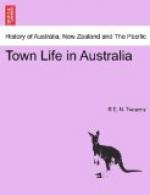The recent exposure of grave political scandals in Sydney has attracted attention to the seamy side of the political life of the colonies. But such scandals, I would fain believe, are exceptional. The tone of the Sydney House is little, if at all, better than that of the Melbourne one, in spite of the members being unpaid. Political adventurers—the curse of communities like these—are perhaps not so numerous, for the L300 a year paid to every Victorian M.P. offers special facilities for the professional politician, but some light has recently been thrown on their misdeeds. The questions under discussion in Sydney are also less important. But the very unimportance of New South Wales politics leaves open a wide door for strong language. I have a vivid recollection of hearing one member talk about the ’effluvium which rises from that dung heap opposite,’ alluding to another member, who fortunately was well able to return the compliment in kind. Both, however, are amongst the most useful men in the House. Such amenities are mere matters of everyday occurrence, ripples without which the debates would stagnate. The pity of them is that they discourage men of education and position from descending into the political arena, and even corrupt the manners of those who do. Still, one must bear in mind that, however much a low tone is in itself regrettable, it is no criterion of the work of which the House is capable and which it actually gets through.
In South Australia the tone of the House is much higher than in any of the other colonies. The general standard of ability is not so high as in Victoria, but the social status and general respectability of the members are considerably higher. The House seems to be impressed with the idea that it is considered the most respectable in Australia, and to strive to maintain its reputation in that respect. So mild is the general tenour of the debates, that an old House of Commons reporter assures me that the South Australian Assembly is a more orderly body and far more obedient to the Chair than St. Stephen’s. Personalities of the warmer kind are considered bad form, and one of the ablest men in the House has completely lost all political influence from the shadiness of sundry transactions which, in the sister colonies, would most assuredly have been forgiven long before they were forgotten. Of course the House is hot free from adventurers, but they are of the better type, and have to conform to a fairly high standard of political morality, if they wish to obtain office and influence. As I stated before, the absence of burning political questions, and the peculiar temperament of the colonists, has led to a reputation for respectability being the chief recommendation for a seat in the House. There is occasionally a little ‘log-rolling’ to obtain the construction of public works in particular districts, but like everything else in South Australian politics, this is very ‘mild,’ and the struggle between the districts is never sufficiently strong to interfere seriously with the common weal.




